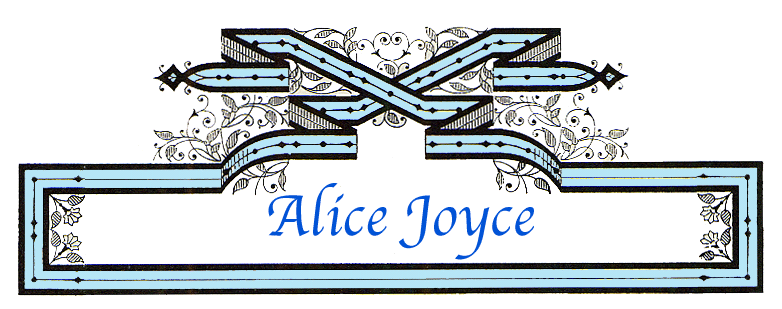

Dollars and the Woman (1920) Vitagraph Co. of America. Vitagraph Specials. Distributor: Vitagraph Co. of America. Presenter: Albert E. Smith. Director: George Terwilliger. Scenario: Lucien Hubbard. Camera: Joe Shelderfer. Cast: Alice Joyce, Robert Gordon, Crauford Kent, Jessie Stevens. 6 reels This film appears to be LOST
| Lobby cards (Thanks to Derek Boothroyd for these scans) | 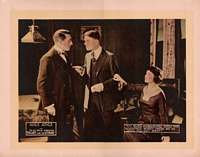 |
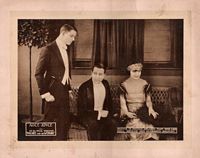 | |
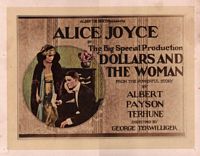 |
|
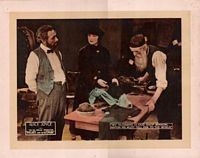 |
Produced by Vitagraph Co. Adapted from Book by Albert Payson Terhune. Directed by George Terwilliger
| Madge Hillyer | Alice Joyce |
| Dan Hillyer | Robert Gordon |
| Arthur Crewe | Crauford Kent |
| Mrs. Sherman | Jessie Stevens |
[omitted, 2 photos: 1. Alice Joyce in hat and fur collar. Caption: Alice Joyce, who as the star of Vitagraph's "Dollars and the Woman" adds another appealing role to her list of screen heroines. 2. Joyce sitting on couch gives a teacup to a man. Caption: Alice Joyce and Robert Gordon in "Dollars and the Woman" (Vitagraph) see no reason why a cup of tea, a comfortable sofa, and a squeeze of the hand shouldn't make anybody happy]
In putting "Dollars and the Woman" on the screen, the Vitagraph was enabled to photoplay one of the most interesting subjects that company has done in a long time. As Terhune writes vividly and interestingly upon the "eternal triangle" theme it is only natural to assume that a cameraed version of one of his stories is bound to prove of intense interest. This proves true of the Vitagraph's splendid picturized version of "Dollars and the Woman."
The subject is not only admirably connected and superbly adapted for the screen, but was effectively cast by Vitagraph. The four principal roles are excellently portrayed by Miss Joyce, Mr. Gordon, Mr. Kent and Miss Stevens.
The Hillyers are happily married. At the outset they are enjoying apparent wealth and luxury when Mrs. Hillyer learns that her husband's supposed wealth is only enveloping them in debt. So they agreed to move over to an obscure apartment on the lower East Side of New York. Hillyer has a patent for a mine windlass to be used in smelting, and finally has to go to San Francisco to interest Colonel Barnett, of the Coast Smeltering Company, in its exploitation. To help him meet expenses his wife borrows $300 from an old suitor, Crewe, and this same Crewe later pays her a hospital bill when her husband is away. Crewe also saves her life by resorting to a ruse whereby he taunts her about getting well and paying back the borrowed money. Crewe also heads the rich smeltering interest that buys Hillyer's patent and makes Hillyer rich. Then comes the discovery of Crewe's check for $300, and Hillyer upbraids his wife. After a scene, Crewe tells just what had been done. Hillyer offers to release his wife so that she can marry Crewe. However, Madge loves Dan more than Crewe, and everything straightens itself accordingly. There are some big scenes between the Hillyers and Crewe that provided the director with all the climaxes and sub-climaxes he needed to make a good picture.
"DOLLARS AND THE WOMAN"
Vitagraph Presents Alice Joyce in Albert Payson Terhune's Timely Story of Domestic Economy
Reviewed by Mary Kelley.
THE cost of financing a husband, which a woman pays in money, health and happiness, is the theme of "Dollars and the Woman." It will make its biggest appeal to feminine fans, as the story was conceived out of close sympathy for the trials and sacrifices of devoted wives. This point of view could have been exploited more effectively, however, if there were more cheerful scenes by way of contrast. The atmosphere is gray, almost without relief, and to preserve the spirit of dolefulness, a number of incongruous situations have been arranged. More alert directing could have remedied this fault as well as a tendency toward effusiveness in the more sentimental scenes.
Alice Joyce's role is that of a young wife whose practice of stringent economy has enabled her to save up a small sum, which covers the expenses of an important business trip of her husband's. Whle he is gone, her child is born and she is left in a state of helpless poverty. A friend comes to her aid, unknown to her, and this brings complications which result in a marital misunderstanding.
Miss Joyce assumes the responsibility of her unhappy role with becoming gravity. Her scenes of endurance and disappointment are very real. The ambitious, somewhat thoughtless husband is played with pep by Robert Gordon. Crauford Kent is quietly successful in a heavier role. The matter of settings has evidently been given careful consideration and the results are good. Photographically, too, the picture is pleasing.
The Cast.| Madge Hillyer | Alice Joyce |
| Dan Hillyer | Robert Gordon |
| Arthur Crew | Crauford Kent |
| Mrs. Sherman | Jessie Stevens |
Story by Albert Payson Terhune.
Scenario by Lucien Hubbard.
Direction by George Terwilliger
Length, Six Reels.
The Story.
The Hillyers, a young married couple moving in society, are suddenly reduced to a low state of finances, due to their reckless extravagance. Dan, the husband, an ambitious inventor, imparts the news to his wife and she cheerfully assures him that if he will let her manage things, she will do her best to economize and assist him in saving. They move into a small inexpensive flat and do their shopping at cut-rate stores. His wife's assistance as well as the fact that he is soon to become a father, spurs Dan on to perfect his invention and get it on the market.
To accomplish this he is obliged to make a business trip to California. Madge, by depriving herself, has saved a small sum which is just sufficient for this emergency. She withdraws this amount from the bank, but is watched in so doing and is robbed. Desperate for a way out of this dilemma, she goes to Arthur Crew, a wealthy bachelor, and asks his assistance. his manner at first is insulting, but he finally gives her the desired amount, $300 in cash. She does not tell Dan of her accident in being robbed and her visit to Crew.
Shortly after Dan leaves, Madge's child is born. Her hospital expenses are paid by Crew, unknown to Madge, who is informed by the hospital authorities that there will be no charges. Out west Dan has made good and sends home $1,000. Madge pays off her debt to Crew and looks forward to happier times. But when her husband returns he spends his money extravagantly and she fears another crash. Misunderstandings and unhappiness result and culminate in Dan's discovery of Madge's record of having paid $300 to Crew. He learns also about her hospital expenses and believing her to be untrue leaves her. Crew then appears and offers his name and protection to Madge. But Dan has decided to reconsider and the existence of their small son serves to reunited husband and wife.
Last revised October 1, 2010